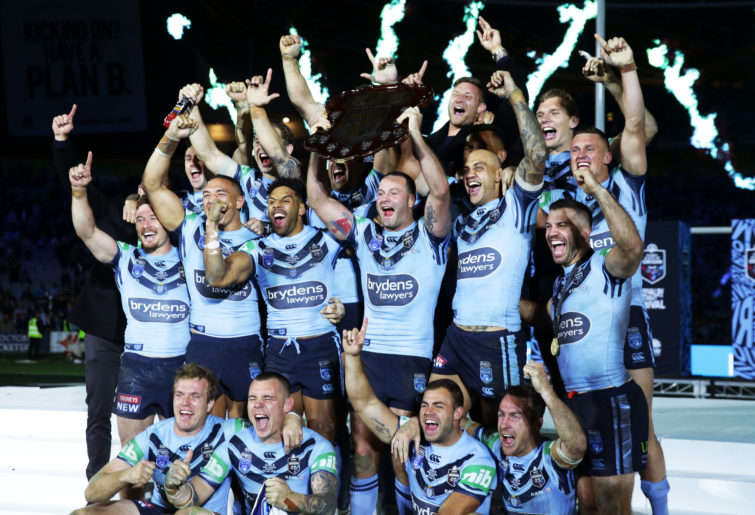NRL Round 7 judiciary: Roosters star duo charged
James Tedesco will be free for the next game of the Sydney Roosters' inconsistent NRL campaign after escaping suspension for tripping Ryan Papenhuyzen. The…
Opinion
State of Origin, the pinnacle of rugby league, returns this week for a salivating spectacle of sport.
Mate against mate, state against state, the pride of New South Wales taking on the truest Queenslanders, live from, Adelaide. Eh?
Particularly given interstate travel restrictions this year, fans may ask why their lot are being asked to perform in front of a neutral fans in a predominantly AFL-supporting audience.
The simple answer, as always, boils down to money. And this isn’t in itself a bad thing, particularly with the ravenous effects of lockdown on the sport’s finances.
The idea of a neutral venue is not inherently evil. It provides equality to a three-game series, a unique travelling experience, new watering holes to ruin, and more opportunities for away attendance than if your team has to travel to enemy territory two out of three times.
But then I would say that as a non-partisan out-of-towner.
Origin is a cash cow, one of Australia’s biggest broadcasts. It attracts viewers from non-participating states and from demographics that don’t usually follow the game. Game 1 alone has reportedly brought $6 million from the SA government.
That doesn’t even cover ticket sales or increased sponsorship and viewership income from bringing the game to a new audience.
In my experience anyway, Origin can act as a gateway drug (in a non-Cronulla Sharks way) to regular NRL fixtures.
Think about what that money could do to help the game, from grassroots right up to the elite level.

(Photo by Matt King/Getty Images)
But if this represents the total ambition of NRL HQ, if they are content with a tri-annual smash and grab bank-job with no greater intentions, then ultimately such money-making exercises are time limited.
In the never-ending internecine code war between Rugba Leeg and Aussie rules, State of Origin is a unique advantage. Unwilling or unable to contemplate the potential of the international game, Origin provides that tribalist, elite competition above club level that the AFL does not.
The quandary is how long this can go on for. Speaking nothing of the risk that those in Victoria set up their own Origin-style competition to suck the oxygen from rugby league (they attracted over 90,000 to the MCG back in 1989 for such a tie after all), the risk remains that the Maroons-Blues novelty in a different state wears off.
Locals may become disillusioned with a tie between two outside states in a game that offers them no pathway or regular involvement opportunities.
I‘m not saying that Peter V’landys needs to put NRL teams in Adelaide and Perth right away (sorry old Rams fans), nor should the intensity of Origin be diluted into a Sheffield Shield style competition.
Victoria has had the Storm for over two decades, yet would struggle to put up a side that could take on a Country or U23s outfit. The game receives its best and most fervent backing from the eastern states, and it should reflect that.
But that should not distract from the potential for long-term rugby league presence in other states that connects with the community and provides a pathway to graduate to the elite level.
The authorities could use the most high-profile rugby league game in SA’s history, and just a fraction of its income, to establish an SG Ball Cup side à la West Coast Pirates.
They could guarantee at least one NRL fixture in Adelaide a season (as opposed to Origin every three years, at best) to build up a long-term, rolling interest in the game. It won’t eclipse AFL as the most popular code, but that shouldn’t preclude initiatives to build up game-wide fan-bases and player pathways.
Fundamentally, it requires a subtle shift in mindset. The announcement of external state funding for Origin fixtures borders on triumphalist, boastful of securing ‘their’ money for Eastern states. Instead that money should be for the game as a whole.
The majority of that will go to Blues and Maroons territory because most of the game is played and consumed there, but it would be unfair and self-defeating not to recognise the source of that new income, and support the game in these outposts.
It’s not just about maintaining what’s been gained, but building on these events and putting down roots for the betterment of the sport.
If the NRL wants to continue with this travelling roadshow, it needs to give back to the communities from which it is reaping the financial rewards.
Not just out of benevolence or ‘the greater good’, but to ensure future viability and interest in the sport when they return.